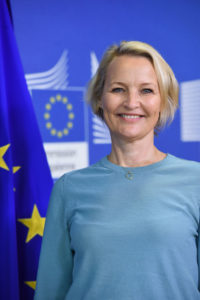
The challenges of the European energy policy for the next five years
A new European Commission, the Executive Government of the European Union (EU), commenced its work on 1 December 2019, chaired by Ursula von der Leyen. For the duration of this five-year term, one of the political priorities is abundantly clear: that of the fight against climate change with an emphasis on the issues related to the energy transition.
To become the world’s first climate-neutral continent in 2050, Europe will have to further reduce its emissions without delay and responsibly by at least 50% or even 55% by 2030. To achieve these goals, the Commission just came forward with a package of comprehensive and coherent measures called the European Green Pact. Given that energy production and consumption account for 75% of EU emissions, it is clear that the European energy policy will have a central role to play in this Pact.
Furthermore, it is essential that Europeans have access to affordable, secure, reliable and clean energy. Regional interconnectivity, a more efficient energy market as well as research and innovation are important issues to be dealt with.
The new Commission will explore the consolidation of an integrated, interconnected and optimally functioning European energy market. This will help keep prices low for consumers, increase clean energy consumption and make the energy supply more reliable and secure. All the legislation that has been adopted during the last term will also have to be implemented, in particular on energy efficiency and renewable energies and on the internal electricity market. Close collaboration with the Member States is necessary, if only to properly define and implement their national energy-climate plans covering the various energy and climate sectors in a coherent manner for the next ten years.
Europe has also recognized the importance of the principle of “energy efficiency first” and is preparing the modalities for its implementation. Improving the energy performance of buildings and accelerating renovation rates is a priority in this context, given the significant potential that this represents in the fight against climate change, the revival of economic activity, the improvement of life quality and the reduction of energy poverty.
To meet the increasing electricity needs, the potential of renewable energies, especially offshore, will have to continue to be exploited. The idea is to promote a flexible and secure electricity system, largely based on these variable sources, and to accelerate the deployment of clean energy in the economy as a whole. This implies increased interconnectivity and improved energy storage, especially with respect to battery technology.
To deploy investments in clean energy, we will have to create the appropriate financial incentives, notably through a new investment plan for a sustainable Europe. It also means investing in the missing infrastructure of our energy system, to help the EU reach its electricity interconnection target and to develop more cross-border cooperation around renewable energy installations and networks.
All of these policies must always take into account and support people who are the most vulnerable and exposed to these transformations, while ensuring that no one is left behind. The Commission will implement a new Just Transition Fund, which will include targeted assistance to the regions that will be most affected by the energy transition, such as the mining regions and the European islands.
In all of our energy policies, the emphasis will be put on the need to place consumers at the heart of our energy system. The new provisions relating to self-consumption and citizen energy communities allow consumers to play a greater and direct role in the deployment of renewable energies and the energy transition in general.
Regarding energy poverty, we have to remember that more than 50 million European households cannot afford to heat their homes properly. A priority will be to help Member States identify the areas that need the most help, using the Energy Poverty Observatory.
The European energy policy will also need to address the issue of a new carbon tax, as well as the review of the Energy Taxation Directive to ensure it is in line with our climate commitments. As part of wider efforts to expand the international role of the euro, we will look at possible ways to significantly increase the use of the euro in the energy markets, given that the EU is the largest energy importer in the world but that approximately 85% of our imports are currently paid for in dollars.
Gas will continue to have a role to play as a transitional energy source towards a carbon neutral economy, while aiming at its progressive decarbonisation thanks to the deployment of renewable and low carbon intensity gases. As for nuclear energy, we will continue to focus on improving the standards of safety of nuclear power plants in Europe and continue nuclear decommissioning of existing installations.
In conclusion, it is clear that the Green Pact for Europe is an imperative for the health of our planet and our citizens, but also for our economy. This Pact is Europe’s new growth strategy, which will help reduce emissions while creating jobs. The European energy policy is undoubtedly at the heart of this new revolution.

















